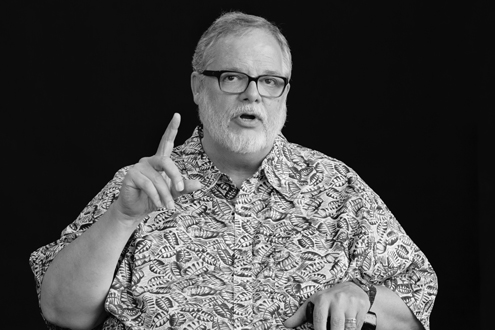
Mark Pope is a professor and the chair of the Department of Counseling and Family Therapy in the College of Education at UMSL. (Photo by August Jennewein)
Being recognized as a leader in your field is an amazing honor. Being called a tireless crusader, founding father and advocate is humbling. But changing the world is empowering.
Mark Pope, professor and chair of the Department of Counseling and Family Therapy in the College of Education at the University of Missouri–St. Louis, has spent his career contributing to, fighting for and educating in the career counseling field with a particular focus on the lesbian, gay, bisexual and transgender community.
Known as the grandparent of career counseling for the LGBT community, Pope is a recognized international expert in various aspects of counseling with sexual minorities, including gay and lesbian career development, violence in schools against sexual minority youths, sexual behavior in aging gay men and psychological testing with sexual minorities.
He has advocated for LGBT individuals, as well as all members of underrepresented and culturally marginalized groups in American society for more than 35 years.
How did you become interested in career counseling?
There were several instances that reinforced my decision, but the bottom line for me was that career counseling was uncompromisingly positive, focusing on people’s strengths rather than weaknesses. And that was very attractive to me.
What inspired you to focus on the LGBT community early in your career?
No one else was. Counseling with LGBT persons was in its infancy in 1973 when I began working on my master’s degree in counseling. I had seen the injustice that was being perpetrated on gay, lesbian and bisexual people because of the inclusion of the diagnostic category “homosexuality” in the psychiatrists’ list of mental disorders. I wanted to change that. It really was that simple.
You’ve received considerable recognition recently from your field and colleagues, what impact do you think you’ve had?
Simply by being “out” as a gay man, I have had a huge impact on the profession of counseling. In 2004, I was selected for the “OUT 100” as one of the major contributors to lesbian and gay culture in the United States in that year. Counselors rarely make such a high profile list, but I received this recognition for being elected as the first openly gay person to serve as president of a major mental health professional association, the American Counseling Association, exactly 30 years after the removal of “homosexuality” from the list of psychiatric disorders in the United States – repudiating once and for all the illness model used to limit the rights of gay, lesbian and bisexual individuals in the United States and around the world.
You’ve been called an inspiration to many, but who inspires you?
My mother inspired me to keep trying to reach my full potential as a human being through education and helping others. She spent her life as an elementary school teacher in rural southeast Missouri and she touched so many lives.
What would you most like to be remembered for at UMSL and in the field of career counseling?
We changed the world. My colleagues and I trained a hell of a lot of good counselors, who carried our work to the rest of the world.
—–
Over the last two years Mark Pope has received several career-highlighting awards, including:
*Named one of nine extraordinary leaders in the 100-year history of the career counseling profession by the National Career Development Association
*Lifetime Career Achievement Award from the Missouri Career Development Association
*2012 GLBT Educator of the Year Award from the National Organization of Gay and Lesbian Scientists and Technical Professionals, an affiliate of the American Association for the Advancement of Science
*Inaugural Diversity Initiative Award from the National Career Development Association
This story was originally published in the fall 2013 issue of UMSL Magazine.














